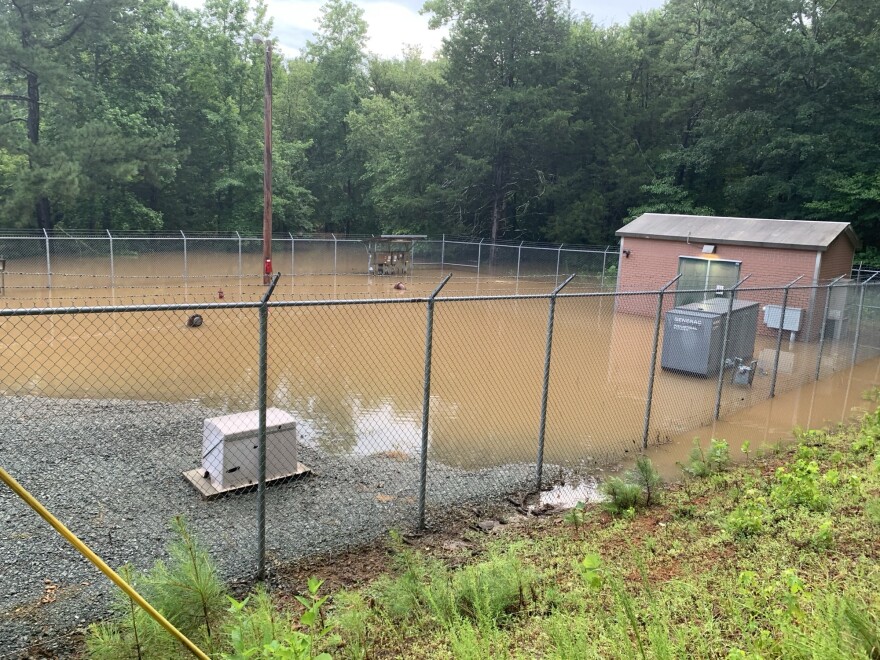North Carolina is among 20 states suing FEMA to restore its main grant program aimed at helping local governments prevent damage from natural disasters.
The Trump Administration ended the program even as the nation is experiencing increasingly frequent and wetter storms - like Helene and Chantal in North Carolina and Barry, which triggered the deadly flooding in Texas earlier this month.
The program is known as BRIC - "Building Resilient Infrastructure and Communities" - and was created during President Trump's first administration.
FEMA canceled the grants in April without warning, affecting hundred of projects around the country.
The agency didn’t respond to a request for an interview on the BRIC grant cancelations. Instead it emailed a statement that said "resiliency is a priority" for the agency, but accused the Biden Administration of using the BRIC program as "a piggy bank for its green new deal agenda."
The state says $200 million in grants were affected in North Carolina alone, leaving dozens of communities – some of them in mid-project – unsure what to do.
Many of the canceled grants were for projects to make water and sewer systems less vulnerable to flooding. These typically have key components near streams.
Hillsborough was planning to use a $6 million BRIC grant to build a new main wastewater pumping station. The current station is alongside the Eno River.
In early July - less than three months after Hillsborough leaders learned about the canceled grant - Chantal dumped more than 10 inches of rain on the town over a few hours, lifting the Eno River more than 20 feet above normal. The floodwater submerged the pumping station and destroyed the equipment inside. The town also lost more than $2 million in vehicles from flooding at its public works facility.
"To be clear, the impact of Tropical Storm Chantal on the river pump station is exactly the type of scenario that BRIC grants were intended to protect the public from," said Hillsborough Mayor Mark Bell.
For days after the storm, until the town could get temporary mobile pumps running, untreated wastewater spilled into the river.
"Our early projections are that this was close to a 1,000-year flood event," said Town Manager Eric Peterson. "Much of the equipment, infrastructure, and vehicles that were destroyed or heavily damaged in Hillsborough were not only outside the 100-year flood plain, they are outside the 500-year benchmark."
Across central North Carolina, Chantal washed out roads and bridges, damaged utilities, and devastated homes and businesses.
Such storms are getting more frequent and more severe, in part due to climate change.
Chad Berginnis of the Association of State Floodplain Managers says annual damage from floods in the United States has roughly doubled every decade since the 1990s. It now averages about $40 billion a year.
"That is happening far faster than we are adjusting, I think, on the mitigation side, on the preparedness side, on the prevention side," Berginnis said. "We're going to need to be much more bold in the solutions going forward."
That’s why the BRIC pre-disaster mitigation program was so important, he said. While FEMA is better known for helping communities recover after storms, preventative measures are much more cost effective, Berginnis said.
A study last year by Allstate, the U.S. Chamber of Commerce, and the Chamber’s foundation found that every dollar communities spend on climate resilience and preparedness saves $13 in damages, cleanup costs, and economic impact.
Berginnis said if FEMA doesn’t reverse course, more of the cost of mitigation will fall on states and communities. That will probably mean money for such projects will become even harder to find, with the communities most likely to suffer being those with the least resources.

In North Carolina, that would include Pollocksville.
The town of fewer than 300 people on the Trent River near New Bern was almost completely flooded in Hurricane Florence in 2018.
It was about to start work on a BRIC-funded project to elevate the half-dozen still-empty buildings that are essentially its downtown.
The project would cost nearly twice the tiny town’s entire annual budget of about $700,000. Pollocksville Mayor Jay Bender said the town spent more than four years jumping through bureaucratic hoops to secure the BRIC grant.
"And then, of course, FEMA pulled the plug on the whole thing," Bender said.
When it canceled the grants FEMA briefly posted a statement on its website calling the BRIC program wasteful, fraudulent and political.
Bender, who has been mayor for more than 40 years, shakes his head at that. He noted that the town is so small it can’t afford a police officer, has no full-time staff, and he’s paid $125 a month to act as both mayor and town manager.
"There's nothing political about it, nothing wasteful about it, nothing fraudulent about it," he said. "We were just trying to… get back from a disaster that that knocked us for a loop seven years ago and and we're still not back.
Hillsborough is larger, with a stronger tax base. But even so, the BRIC projects would be hard to fund on its own, said Mayor Bell. In addition to the $6 million grant for the pumping station, the town also lost a $1 million BRIC grant to add a second emergency water connection in case a storm knocked out both its main water system and its current backup connection to Durham.
In North Carolina, utility improvements typically can’t be paid for with property taxes, and it would be hard for a town like Hillsborough to ask its 10,000 residents to shoulder such a large amount with water and sewer fees.
"We have a limited number of ways to be able to pay for that infrastructure, so a big grant is just such a huge deal for a small town," Bell said.
Like their counterparts in Pollocksville and several other North Carolina communities who lost the grants, Hillsborough officials say they hope that either FEMA restores the money, or they’re able to win a state mitigation grant to restart the projects.
The lawsuit filed by North Carolina and the other states says FEMA’s decision was illegal, because Congress designated the funding for mitigation projects. It asks a federal district court to restore the BRIC program.










